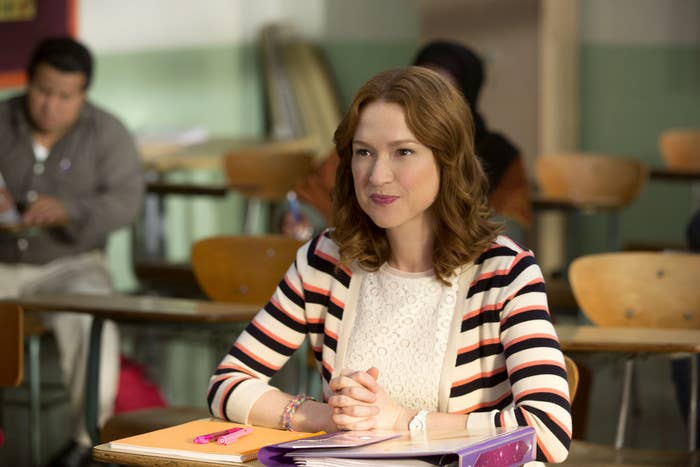
Netflix recently released all 13 episodes of Unbreakable Kimmy Schmidt, a comedy co-created by Tina Fey about the NYC travails of Kimmy Schmidt (Ellie Kemper), one of four "mole women" (as they're dubbed) freed from an Indiana dungeon where they'd been kept prisoner by a deranged preacher. It sounds ridiculous (and fraught, given its clear similarities to a very real and very traumatic event in Ohio), but the show is funny, filled with potential, and highly, highly watchable. And yet, it deals with race in an almost cavalier way.
Anne Helen Petersen: Let's start at the beginning: What were your first impressions of the show?
Alex Alvarez: I definitely enjoyed, like you said, mainlining it the weekend it came out. And I will watch anything Jane Krakowski does, ever, so my very first impression was "YES" and "I'm going to be singing this theme song all month."
Ira Madison III: I loved it. I'd been missing 30 Rock like whoa and there's only so many times you can watch Mean Girls or see Tina Fey host an awards show before you want some new scripted comedy from her. I binged the entire show in about four days, trying in vain to space it out.
AHP: I've been thinking back about how 30 Rock deals with race: There are so many moments when you think, Wait, is that actually racist, or drawing attention to racism through satire? It's a very, very fine line — and I think that show got away with a lot that it wouldn't have otherwise almost entirely due to Tracy Morgan's inclusion. Is Kimmy Schmidt treading that same line?
AA: One thought I kept having as I was watching Kimmy Schmidt was, This feels like a very white writers room. I have no idea whether every person in that room was actually white, but the writing felt like it was written from a perspective that didn't feel as if we're all talking about a communal experience together. I think satire is an extremely important tool in discussing race and the status quo, but I think the person PROVIDING that commentary is an important factor for the success of that satire.
With 30 Rock, the setting was also so crucial, because a lot of time was devoted to skewering media and this sort of self-congratulatory New York liberal attitude, which is great. Those are fine targets. I'm not sure an undocumented Vietnamese delivery dude trying to put his way through school or a Native American woman who feels the need to change her identity to fit in is as great of a target for that sort of skewering. And it very much felt that the joke was more about them and less about the systems within which they're performing.
AHP: Really good point, Alex. I actually had a moment when I went to go look at the race of the writers on IMDb, as if to tell myself, "Oh, it's not an all-white writers room, so maybe it's OK?" I think the narrative we now tell ourselves goes something like: If it's a diverse writers room, then it can't be racist. But that's not necessarily the case.
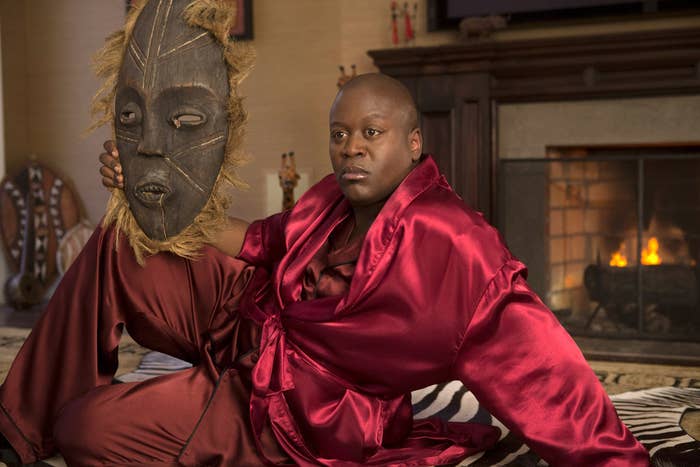
IM3: Race was something I constantly struggled with on 30 Rock. There were a lot of instances where I found Tracy's performance funny, but only because of his delivery. As it stands, I'm not really a fan of the stereotype as comedy trope. Tracy was first introduced as one and remained that way for the rest of the series. I've been more optimistic about Titus on Kimmy Schmidt because I've seen him go through more character development in the span of a season than Tracy did throughout seven seasons of 30 Rock.
There were some really great moments in Kimmy Schmidt where blackness and masculinity were confronted in actual storylines, which is not something I felt like 30 Rock ever truly did well. The only time I seriously felt uncomfortable as a black viewer was the opening, with the Antoine Dodson-esque character singing the theme song. But then I got over it, because the song is catchy, so I don't know if I became comfortable with it or was just Stockholmed into liking it. It's one of those weird cultural things where black people doing something funny becomes humorous to a large group of white people (Antoine Dodson of "The Bed Intruder" viral video fame), but as a black person, you don't feel like they're laughing at it the way you are.
AHP: Yes! And I think that because one of the main characters on Kimmy Schmidt is a black gay (rural) male, and the narrative does something nuanced with his negotiation of the world, many people have ignored the more egregious treatment of Asian and Native American characters.
IM3: I agree. For as much fun as I found Titus, I was IMMEDIATELY like WTF when Dong showed up on the screen. It felt like more of the same stereotype as a joke that 30 Rock often did poorly, and Dong contrasted with Titus, who was actually dealing with real issues like having to act straight to get acting roles or being a black man in a gentrifying city. Dong, on the other hand, felt like the brother of 2 Broke Girls' Han Lee.
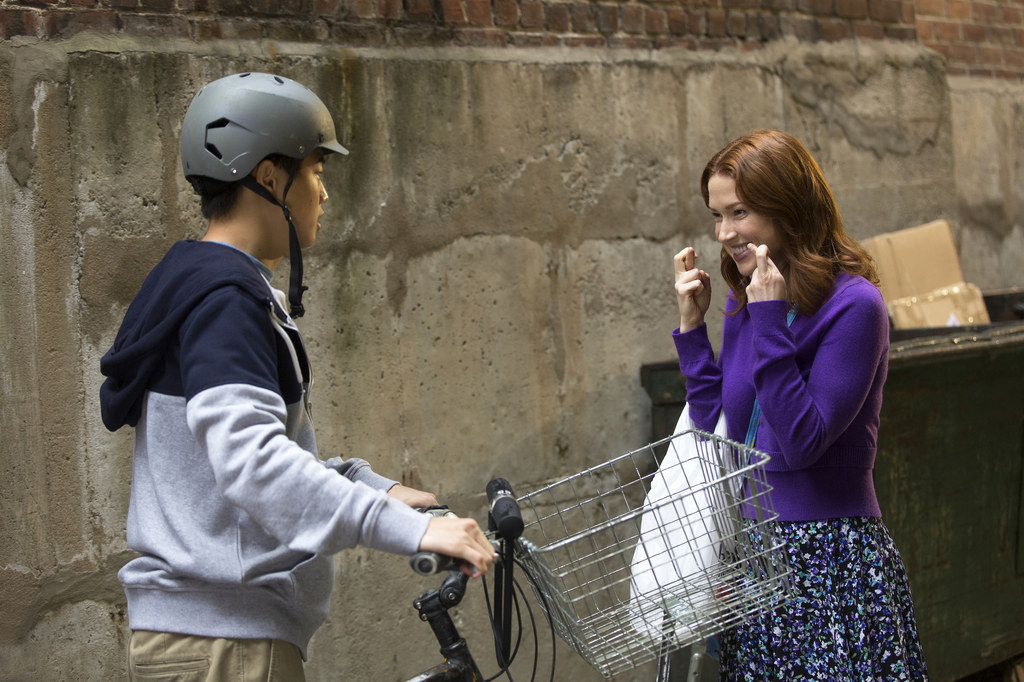
AA: It felt so dated to me. Dong's entire story arc — especially compared to the hot tutor dude and the wealthy British dude — felt like something out of an '80s rom-com.
AHP: There was like a SECOND of promise when they talked about how Kimmy means Penis in Vietnamese — as if they were about to do something actually subversive. BUT OH WAIT, NEVERMIND.
AA: EXACTLY. I think showing that this can happen across cultures and not just broadly with "Asians" positioned as "Other" would have been truly subversive social commentary.
AHP: And there was an opportunity to do something with his status as a legally designated outsider (aka his immigration status).
AA: THAT. That whole storyline also made me wonder, as a viewer, like, Why is this in here? If you're not making any strong statement about it, if it's not necessarily developing a character or the plot, and, more importantly, if it's not FUNNY, what's the point? A lot of this felt like a rough draft that hadn't been revised or punched up.
AHP: It's especially egregious when you put it next to something like Fresh Off the Boat, which has done such a fantastic job of offering very culturally specific representations that are somehow both hilarious and poignant.
AA: Exactly. Fresh Off the Boat has so many references that are like, Yup, this show gets it. I watch it every week with my fiance, whose mom is Chinese, and there are so many moments when he'll just nod and be like, Yup, relate. We did that. My mom says that. I've felt that. Needless to say, that didn't happen with Kimmy Schmidt.
IM3: Things got really weird for me, actually, once Kimmy started going to school. I know she probably had to, but the idea of a GED class never really had any kind of biting satire to me. It was very Welcome Back Kotter, but somehow less progressive. And I guess that's the difference when a show is written by someone who gets that culture. Fresh Off the Boat seems authentic to me.
When characters aren't authentic, you don't relate to them — they feel like caricatures/outsiders. You don't have to be Asian to connect with that show, because the specificity of the characters/culture makes them seem real to you. The same for shows like Empire and Jane the Virgin, where you have Ilene Chaikin and Jennie Urman as showrunners, but every character still feels authentic thanks to a diverse writing, acting, and production team. I know that Donald Glover and others were on 30 Rock's writing staff at some point, but watching Kimmy Schmidt, I got no sense that there were any nonwhite staffers who could give us the specificity comedy needs to thrive.
AHP: Hard, hard agree, Ira. What about the contention that the representation of Native Americans/Jane Krakowski's character, Jacqueline, is OK because we're meant to understand that she, like Kimmy, is just a cultural outsider striving to find her place?
AA: That parallel feels so clumsy to me! Comparing someone's heritage (especially as part of a group that, historically, has been misrepresented and mostly invisible in American pop culture and media) to a woman who had been — I don't even know how to describe Kimmy's situation — kidnapped as a teen and made to live as a mole woman for 15 years? It's just like comparing AN APPLE THAT EXISTS and A FRUIT WE MADE UP.
AHP: If an alien was learning about who we were by watching our television, said alien would never think there was such a thing as Native Americans. That dearth of representation — and the percentage of Americans who live in a part of America where they'd never meet an indigenous person — means that what they know about that group of people, they almost certainly have gleaned from media representations.
Which is all to say that the way Native Americans are represented on this show matters. It's not one representation among a cornucopia of representations; it's the single mainstream representation in years. We've thought and written and talked about representation in the context of other minorities for so long — and watched as the number of gay people and black people and Hispanic people on television slowly rises — that we almost don't even know how to talk about it when it's so patently offensive, reductive (and, as with Dong, not even funny) as it is here.
IM3: I know next to nothing about the intricacies of Native American culture and even I was like, um, this doesn't seem...right? And just like Dong, it was a bunch of jokes that we've heard before but said in a winking, "isn't it funny, we get it's racist!" kinda way. Like, OK, cool. But in the real world, if a white person says those things to me, it's a microaggression and I'm most certainly not here for that. So why is it OK when the white person puts those words into an actor's mouth and just has them say it on TV? What's the difference?
AA: Right. I hate couching racism under the term "hipster racism," because, like, it's the same thing. You're saying the same thing. The result is the same. It's racism whether or not you "mean" to be racist.
IM3: "Hipster racism" exactly, Alex. In my life, I've experienced maybe 30% outright I-hate-black-people racism. But what I have grown up with is people making jokes about black culture, slavery, or random hip-hop songs they heard on MTV and couching them as: See? I'm commenting on race and it's funny, so I'm not racist.
AA: Also, if we are coming from this place of we're cool, our viewers are cool, we get why racism is bad, why not do something that would feel NEW and let, say, Dong take the more active role instead of being the passive butt of the joke? Why not let Jacqueline make the commentary about trying to pass herself instead of having it be weirdly foisted upon her? (I'll admit the only part of the weird storyline that made me laugh was when she saw a majestic buffalo that was actually a deer. But, again, this seems like a joke ABOUT white people, which while, LOL, was not even about her character as an actual Native American.)
AHP: Or why not, you know, cast an actual Native American?
AA: Right! Why not have that give-and-take with someone who has lived this? Why project and guess when you can ask and learn?
IM3: It shows again how the writers don't really get it. If she's supposed to be a Native American outsider, why is the joke that she thinks a deer is a buffalo? Wouldn't Kimmy be the one to think that?
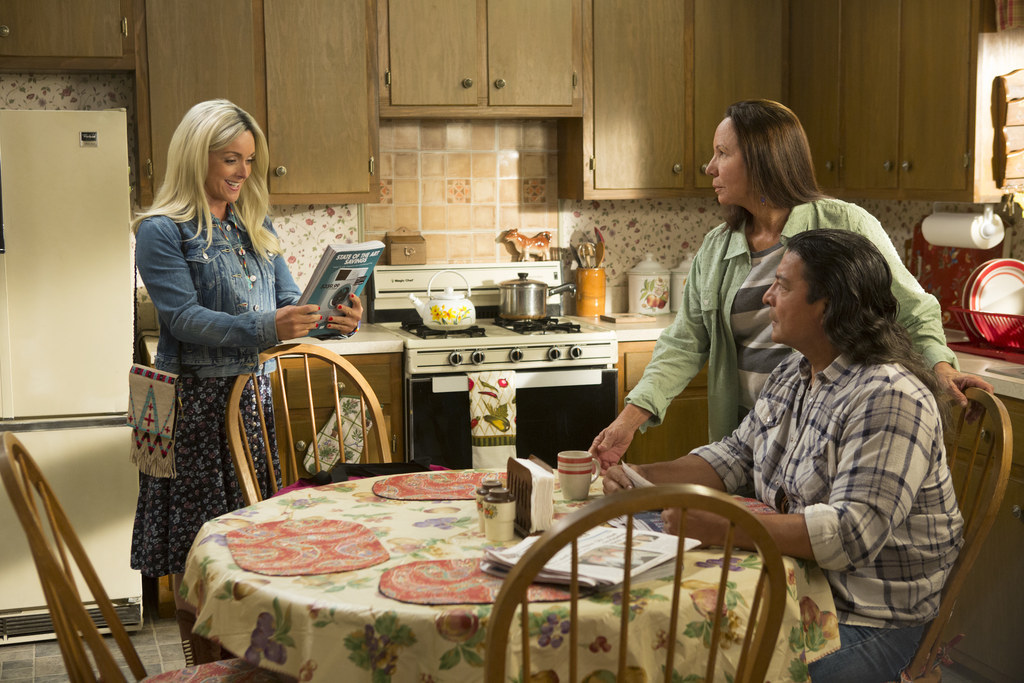
AA: Yup. Again, a lot of it felt really first draft — not in the sense that the jokes weren't funny, because many were, but in the sense that a lot of them didn't seem tethered to who the characters seemed to be?
AHP: Maybe that's because, apart from Kimmy (and maybe Titus and arguably Jacqueline), we don't have a sense of these characters as humans at all. Which isn't necessarily unique: Very few sitcoms really go deep, psychology-wise. I mean, I still feel like I only have the most facile of understandings of the characters of Friends or Seinfeld, in part because the narrative is at the service of the humor, not the development of meaningful relationships. (Parks & Rec is probably the exception here). Is this sort of surface-level treatment just an extension of the form?
IM3: That's a great point, Anne. Sitcoms always do have uneven first seasons and it's the second where they truly start to excel. I'm hoping the characters in Kimmy Schmidt's world are more fleshed out in the second season, which will be made specifically for Netflix and not NBC.
AHP: I've seen people on Twitter say that what we're not talking about is how Kimmy Schmidt represents rural/flyover country residents as incurably backward. For me, I think this is where the satire really does work: By making the ignorance of Kimmy/her family/her fellow mole women so ridiculous, it highlights how preposterous it is for people to believe that that's how someone from Indiana would actually act.
AA: Yes. The stepfather, for instance, was a bizarre character. But it didn't feel to me like this was a send-up of poor, rural, white people, especially since we have him existing in direct contrast to 1) Kimmy and 2) her sister, both of whom don't read as "small town yokel" stereotypes. And because there is so much representation of white people onscreen in general and we're privy to so many archetypes and views of what it's like to be white in the U.S./white as neutral, I can chalk it up to "the stepfather is kind of an idiot" and not "all white people are idiots" or even "not all small-town white people are idiots."
Although I do think this show and 30 Rock both tried to provide send-ups of EVERYONE, from small town Americans to rich New Yorkers (Martin Short's plastic surgeon was by far my favorite character because he was just so fantastically weird and also ABOUT something). It typically worked better on 30 Rock because it was set against the backdrop of the media world and how being a part of that and being privy to its messages can impact people.
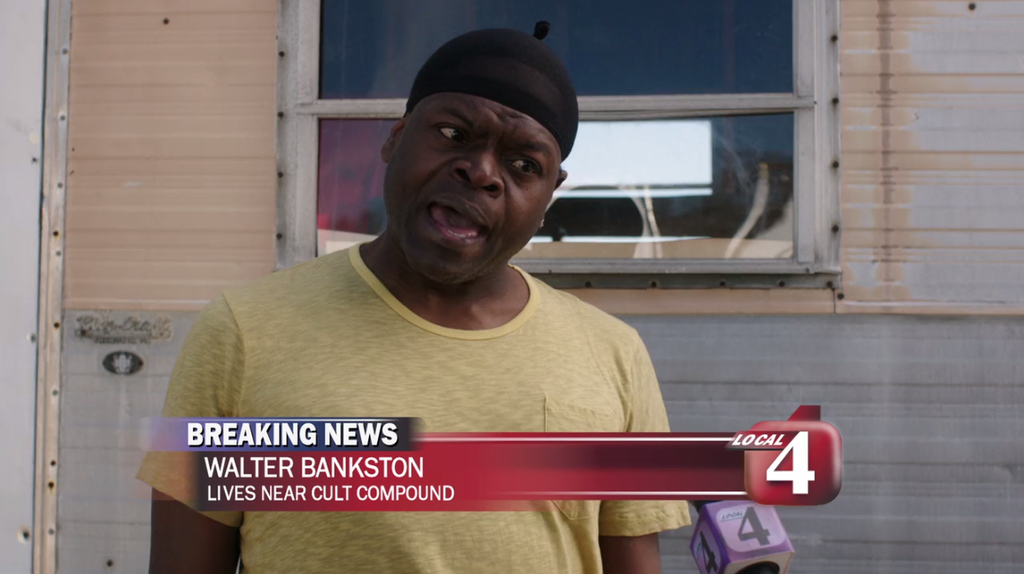
IM3: To loop back on the viral video parody in the opening credits, I laugh at people like Antoine Dodson and the opening credits singer because they say insane things like, "He's climbing in your windows, snatching your people up." But when you see people making viral videos of him, the joke seems more about the fact that he's poor and black and uneducated. The portrayal of the rural townspeople never feels that dire, because it never feels like it creeps into oppression. A viral video like Dodson's can create the idea that all black people are uneducated buffoons, because of the idea that black people are a monolith. The people from Kimmy's town just feel like townspeople from a fictional hick town and no one who views it is going to then interact with all white people in their lives like they've been held prisoner in a bunker for 15 years.
AA: I wondered if the joke was on religious extremism, but it seemed to go back to "men telling women what to do," in an extreme way. And that ultimately seems to be the thesis of Kimmy Schmidt.
AHP: Yes. Which might explain why I finished the season with a bad taste in my mouth, and not just from the way it represented Jacqueline's family and Dong.